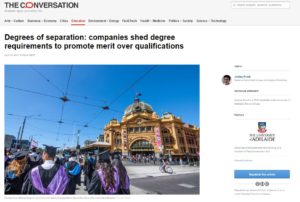 I’ve really struggled to write for the last six months. Whilst looking at my blog from an outsiders perspective there’s a big gap between this post and the last one way back in September, what you don’t see is the handful of post ‘stubs’ that will probably forever remain unpublished that sit in my WordPress drafts, nor do you see the flickers of ideas that have popped into my head that have never even made it that far. This post attempts to understand why – and how it relates to my third year at Flinders.
I’ve really struggled to write for the last six months. Whilst looking at my blog from an outsiders perspective there’s a big gap between this post and the last one way back in September, what you don’t see is the handful of post ‘stubs’ that will probably forever remain unpublished that sit in my WordPress drafts, nor do you see the flickers of ideas that have popped into my head that have never even made it that far. This post attempts to understand why – and how it relates to my third year at Flinders.
higher education
Designing for the Digital Divide
Today saw the release of the 2017 Australian Digital Inclusion Index, which can be downloaded from the Telstra Sales Portal Digital Inclusion website. The report had some positive, although expected, conclusions in that digital inclusion is increasing right across the board, which is the good news. What caught my eye however were the specific mentions of the sociodemographic groups which are the most digitally excluded across the country, specifically:
“…people in low income households, people aged 65+, people with a disability, people who did not complete secondary school, Indigenous Australians, and people not in paid employment.”
Students as partners – moving beyond the customer concept in student services
 The debate of whether students are or are not ‘customers’ of their University is a well worn one, so it was of great interest to see this report published today via Universities UK which put the matter to rest once and for all, and the result was…
The debate of whether students are or are not ‘customers’ of their University is a well worn one, so it was of great interest to see this report published today via Universities UK which put the matter to rest once and for all, and the result was…
University marketing – a diversity of sorts
 It was Seth Godin who described marketing as a contest for people’s attention, and recently I’ve been pondering the different ways which Universities are attempting to grab the attention of potential students, particularly as the looming Federal budget looks almost certain to increase cost for students. The more students are required to pay for Higher Education, the more seriously many of them will take the choice of course and provider, and for that matter consider whether a Degree is even worth it (as I talked about in my last blog post). This pressure will no doubt have University marketing departments hot-to-trot on making sure that their University’s brand is being represented in the most enticing way possible, but across the 43 accredited Universities in Australia offering a highly regulated (and in many cases some would argue largely indistinguishable) product, how are Universities attempting to differentiate?
It was Seth Godin who described marketing as a contest for people’s attention, and recently I’ve been pondering the different ways which Universities are attempting to grab the attention of potential students, particularly as the looming Federal budget looks almost certain to increase cost for students. The more students are required to pay for Higher Education, the more seriously many of them will take the choice of course and provider, and for that matter consider whether a Degree is even worth it (as I talked about in my last blog post). This pressure will no doubt have University marketing departments hot-to-trot on making sure that their University’s brand is being represented in the most enticing way possible, but across the 43 accredited Universities in Australia offering a highly regulated (and in many cases some would argue largely indistinguishable) product, how are Universities attempting to differentiate?
MOOCs won’t disrupt Higher Education, employers will
 Last week I wrote a post on ‘students as customers’ in the context of a more corporatised, commoditised Higher Education market. It was interesting then to see another post today discussing the emerging trend of employers dropping requirements for degrees as part of their recruitment criteria, instead selecting candidates
Last week I wrote a post on ‘students as customers’ in the context of a more corporatised, commoditised Higher Education market. It was interesting then to see another post today discussing the emerging trend of employers dropping requirements for degrees as part of their recruitment criteria, instead selecting candidates
based on merit, rather than credentials, often by assessing candidates with psychometric testing or other performance based tests
This caught my attention for two* reasons. Firstly, it returned my thoughts to the student as a customer, and the likely increase in their willingness to leave the Higher Education system (or not engage in it at all) if it is not meeting their expectations – in this case employability. Secondly, it made me reflect on the role of MOOCs, not as a replacement for a degree, but as a potential perceived indicator of merit in a landscape where a degree is no longer a necessity.